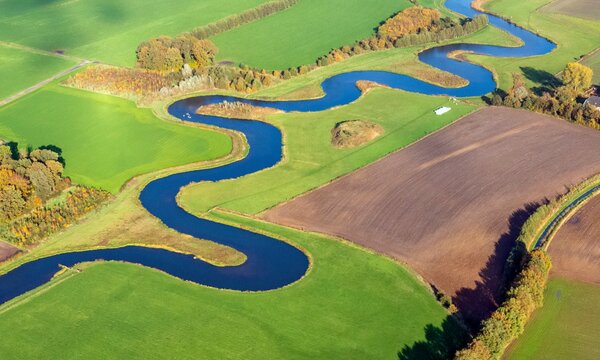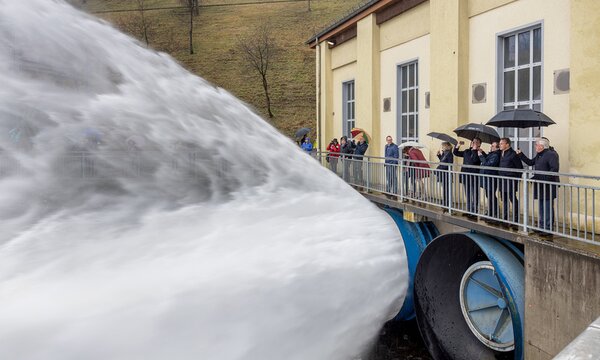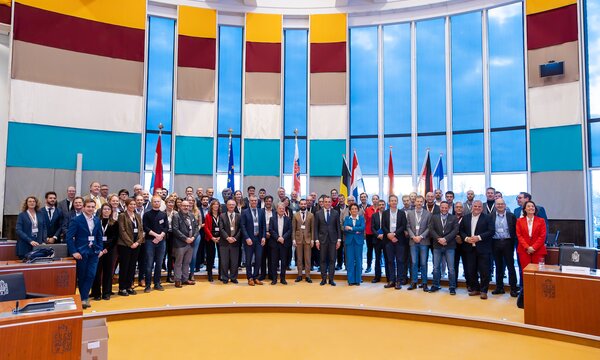We spoke to Alexander Menz, a PhD researcher from RWTH Aachen University, who is conducting his research “Reservoir Operation Under a Changing Future” within the scope of our program. We discussed how his work on the Rur reservoir system could support climate-resilient water management through AI-based optimisation, stakeholder collaboration, and adaptive strategies – balancing competing demands such as flood protection, water supply, and ecology across borders.
Can you briefly describe the main topic of your PhD research?
My PhD research focuses on how reservoir systems can be operated in a more resilient, sustainable and future-proof manner under the conditions of climate change and changing social and economic demands. The focus is on the development, evaluation and optimisation of operational strategies that aim to meet several - sometimes competing - objectives simultaneously: Flood protection, water supply, energy production, ecology, recreation and public services.
The project focuses on the Rur reservoir system in the northern Eifel region, which is of great hydrological importance for the international Rur and Meuse river basins. Due to increasing extreme weather events, demographic and agricultural changes as well as increasing ecological requirements, the adaptation of existing, experience-based operating rules is becoming more and more urgent.
The aim is to analyse the resilience of these operating rules and to transfer them into a modern, demand-oriented management model. Methodologically, I combine classical numerical modelling with AI-based optimisation and a close exchange with regional stakeholders in order to develop a practical and transferable set of rules.
What motivated you to pursue a PhD, and why in this field of research?
I am fascinated by water management as the interface between technology, environment and society. During my studies in environmental engineering, I recognised the central role of water management in dealing with climate change and extreme events. The growing demand for sustainable and resilient use of water resources requires innovative and practical solutions. I am particularly interested in the combination of technical analysis, concrete recommendations for action and direct cooperation with stakeholders such as the Waterboard Eifel-Rur. The international context of my research also shows that water knows no borders. Cooperative, scientifically sound approaches are needed to tackle future challenges together - this is exactly what I want to contribute to with my PhD.
Does your research focus on a specific geographic area? Or is there a specific geographical component in your research focus?
Yes, the geographical focus of my research is the Rur reservoir system in the northern Eifel. This includes the Wehebach, Kall, Dreilägerbach, Urft, Olef and Rur reservoirs - all on the German side, but of great hydrological and strategic importance for the entire international Meuse basin. The special geographical location in a cross-border context makes the study area an exciting case for transnational water cooperation.
The Rur valley reservoir system also plays a central role in the region's water management: it secures the water supply, serves as flood protection and has a significant influence on the flow dynamics as far as the Netherlands. Due to its multifunctional use, e.g. for energy production, recreation, nature conservation, flood protection or as a drinking water reservoir, it is an ideal example of a complex water management system with multiple interests.
What specific objectives are you aiming to achieve with your current research?
The aim of my research is to develop the management of reservoirs in the Rur catchment so that they can better respond to future challenges such as climate change, social change and increasing conflicts of use. To this end, I first analyse the vulnerability of current management strategies to extreme events such as heavy rainfall or drought, as well as to long-term changes such as demographic shifts, agricultural development or increasing environmental demands.
Building on this, the existing, mostly experience-based operating rules are to be transformed into a modern, demand-orientated and more resilient control concept. This takes into account not only the operational efficiency of individual dams, but also their interaction within the network - with the aim of better managing flood and drought situations while at the same time complying with minimum ecological requirements and ensuring security of supply.
The central questions of my project are
-
How do the Eifel reservoirs influence the hydraulic stability of the international Meuse catchment?
-
What are the requirements for a sustainable and climate-resilient operation of the reservoirs?
-
How can environmental, economic and social needs be translated into an integrated management model?
Methodologically, the project is based on four building blocks: a systematic literature review of international operating strategies, a stakeholder analysis with interviews (and workshops), numerical modelling and optimisation of reservoir operation - including AI-based processes - and the transfer of results to other systems.
How does your work fit within the JCAR ATRACE programme and its goals?
My project contributes directly to the objectives of JCAR ATRACE by focusing on climate-resilient water management in a cross-border region. Although the reservoirs to be analysed are located on the German side, they influence water management as far as the Netherlands. Close collaboration with stakeholders from Belgium and the Netherlands is therefore essential. The combination of technical innovation, scientific analysis and regional cooperation supports the overall objectives of the programme: strengthening resilience, sharing knowledge and promoting international cooperation.
Which opportunities and challenges do you envision conducting your research in a transboundary context?
The cross-border character of my research brings with it great opportunities - for example through the diversity of perspectives, institutional experiences and technical approaches. The international exchange provides valuable impetus for innovative solutions and promotes mutual learning.
On the other hand, different legal frameworks, institutional responsibilities and data availability are challenging. These require careful coordination, but also create space for new forms of cooperation. Overall, I do not see the transnational context as an obstacle, but rather as a driver for cooperative and sustainable water management.
How does your research fit within the partnerships between regional governments and academic institutions?
My project is closely networked with regional and cross-border partners in science, administration and practice. Cooperation with the Waterboard Eifel-Rur, which is the central operator of the reservoirs, is at the center of the project. This close cooperation enables the direct transfer of scientific findings into water management practice, for example through the joint development and validation of new operating strategies.
There is also an exchange with other stakeholders, including authorities, municipalities, industry, environmental organisations and institutions from the Netherlands and Belgium. Their perspectives are systematically incorporated into the research through interviews, workshops and discussions. This collaborative partnership bridges the gap between scientific modelling and the needs of operational practice and policy-making.
In which ways do you see your research having an impact on policymaking?
My research provides a solid decision-making basis for the further development of operational strategies and water management planning tools. The combination of scenario development, numerical modelling, stakeholder participation and AI-based optimisation results in concrete, practical recommendations that can be directly applied to water management guidelines, management plans and climate adaptation strategies.
Especially after the flood events of summer 2021, it has become clear that resilient, flexible and forward-looking approaches are urgently needed - both for flood protection and for public services during dry periods. My project shows how targeted adaptation of operational management can not only minimise risks, but also better reconcile environmental and social objectives.
Given the wide variety of stakeholders involved in JCAR ATRACE, what interactions do you look forward to?
I am particularly looking forward to the interdisciplinary exchange with other PhD students, researchers and practitioners within JCAR ATRACE. It is extremely valuable to look beyond one's own research context - especially to see how other regions are dealing with similar challenges, which tools are being used successfully and where synergies can arise.
I find discussions on innovative approaches such as the integration of early warning systems or the use of AI in water management particularly exciting. The exchange with experts from different disciplines and countries not only offers new perspectives for my own project, but also promotes the development of joint, cross-border solutions in the sense of promoting resilience.
What long-term impacts do you envision your research having on regional climate strategies?
In the long term, my research should help to ensure that reservoir systems are no longer considered in isolation, but are understood and operated as an integral part of comprehensive, climate-adapted spatial and water planning. The operating strategies developed should not only meet technical requirements, but also take into account social acceptance, ecological compatibility and economic viability.
By providing concrete criteria and tools for flexible, adaptive management, my research can serve as a model for other regions - especially where reservoirs fulfil similar multifunctional roles and also face complex challenges. The project has the potential to stimulate national and international adaptation strategies and to structurally strengthen the resilience of water management systems to climate change.
Which scientific or technological breakthroughs do you hope to encounter during your PhD?
I expect to see significant developments in the areas of hydrological prediction models, AI-based optimisation and dynamic control of engineering systems. The combination of these technologies with participatory approaches, i.e. combining data-based models with the empirical knowledge and needs of local stakeholders, is particularly promising.
The aim is to develop practical yet scientifically robust tools to enable reservoir operators to respond to a variety of possible future scenarios - in real time or with foresight. Technological innovation is not seen as an end in itself, but as a means to strengthen resilience, transparency and decision-making capacity in complex water management systems.
What are some challenges you anticipate facing as climate conditions continue to change? And how do you see your research adapting to these evolving challenges?
Progressive climate change brings with it increasing uncertainty: extreme events are becoming more frequent, seasonal patterns are shifting and competing demands for use are intensifying. These dynamics pose significant challenges to traditional operational strategies - especially if they are based on fixed empirical values or historical flow regimes.
My research addresses these uncertainties with an adaptive and robust approach: The combination of scenario development, learning models and close stakeholder involvement aims to create a flexible control concept that functions reliably even under changing conditions. Technical adaptations are taken into account as well as institutional and social developments - in the spirit of holistic, future-oriented water management.



